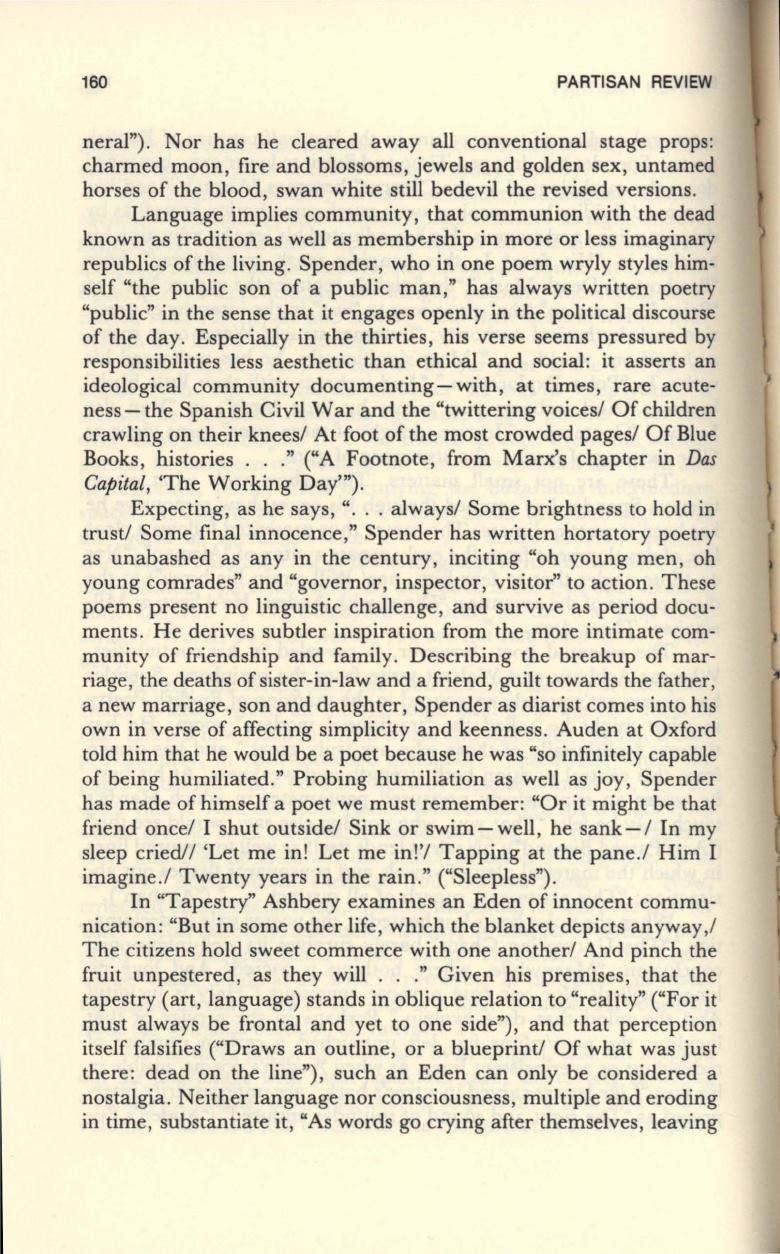
160
PARTISAN REVIEW
neral"). Nor has he cleared away all conventional stage props:
charmed moon, fire and blossoms, jewels and golden sex, untamed
horses of the blood, swan white still bedevil the revised versions.
Language implies community, that communion with the dead
known as tradition as well as membership in more or less imaginary
republics of the living. Spender, who in one poem wryly styles him–
self "the public son of a public man," has always written poetry
"public" in the sense that it engages openly in the political discourse
of the day. Especially in the thirties, his verse seems pressured by
responsibilities less aesthetic than ethical and social: it asserts an
ideological community documenting- with, at times, rare acute–
ness - the Spanish Civil War and the "twittering voices/ Of children
crawling on their knees/ At foot of the most crowded pages/ Of Blue
Books, histories . . ." ("A Footnote, from Marx's chapter in
Das
Capital,
'The Working Day''').
Expecting, as he says, "... always/ Some brightness to hold in
trust/ Some final innocence," Spender has written hortatory poetry
as unabashed as any in the century, inciting "oh young men, oh
young comrades" and "governor, inspector, visitor" to action. These
poems present no linguistic challenge, and survive as period docu–
ments. He derives subtler inspiration from the more intimate com–
munity of friendship and family. Describing the breakup of mar–
riage, the deaths of sister-in-law and a friend, guilt towards the father,
a new marriage, son and daughter, Spender as diarist comes into his
own in verse of affecting simplicity and keenness. Auden at Oxford
told him that he would be a poet because he was "so infinitely capable
of being humiliated." Probing humiliation as well as joy, Spender
has made of himself a poet we must remember: "Or it might be that
friend once/ I shut outside/ Sink or swim - well, he sank - / In my
sleep cried// 'Let me in! Let me in!'/ Tapping at the pane.! Him I
imagine.! Twenty years in the rain." ("Sleepless").
In "Tapestry" Ashbery examines an Eden of innocent commu–
nication: "But in some other life, which the blanket depicts anyway,!
The citizens hold sweet commerce with one another/ And pinch the
fruit unpestered, as they will ..." Given his premises, that the
tapestry (art, language) stands in oblique relation to "reality" ("For it
must always be frontal and yet to one side"), and that perception
itself falsifies ("Draws an outline, or a blueprint/ Of what was just
there: dead on the line"), such an Eden can only be considered a
nostalgia. Neither language nor consciousness, multiple and eroding
in time, substantiate it, "As words go crying after themselves, leaving


